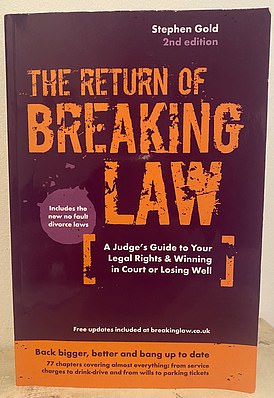
Stephen Gold on legal bills: Negotiate, negotiate, negotiate – but make sure it won’t be the office cat who handles your case after you have whittled down the bill
Stephen Gold is a retired judge and author who has written popular series for This is Money on how to be a successful executor, writing a will, bankruptcy and consumer rights.
In part one of his latest guide, he explained court fees and what to consider before taking what could be the ruinously expensive step of taking court action.
Today, he looks at legal costs in more detail – and suggests eight ways to cut the bill.
Fasten your seat belts. As from the beginning of this year, solicitors will feel they can increase their charging rate if the client is prepared to agree it.
Last time, I looked at the Fixed Recoverable Costs system and where it might and might not be applied.
Where it does not apply, the guideline figures for solicitors on what they can get back from the losing party who has to reimburse the winner have been increased.
Solicitors may therefore be reluctant to charge you less than could be collected from the opposition.
There are different rates depending on where the solicitor practises and the level of person in the solicitor’s office who does the work.
Here are some examples. For City and central London firms, where a qualified solicitor with over eight years’ experience does the work for you, the hourly guideline rate is up from £373 to £398.
For Dartford and Gravesend, it is lower at £301, up from £282. In Hampshire, it is £278. In Bradford, it’s a paltry £272.
Yes, you could instruct a Bradford solicitor (some of my best friends practise there) in place of a firm in Mayfair but you might find that a tad inconvenient and the office carpets won’t be as plush.
Incidentally, these guideline figures can be raised or lowered by the court in exceptional circumstances.
The remedy is to negotiate, negotiate, negotiate – but make sure it won’t be the office cat who handles your case after you have whittled down the bill.
Eight ways to cut your legal bills
1. Haggle over the estimate
The ultimate bill will depend on how much work has to be done and it is important to get an estimate of that and the likely damage from the solicitor who is under a professional duty to provide it.
Seek it before engaging them and ask some pertinent questions.
– What are my percentage chances of winning?
-Is there someone in your firm with less experience than you – like a solicitor or legal executive who has been qualified for less than eight years and so who would command a lower hourly fee – who could take on my case? Have they dealt with cases similar to mine before?
-Do you intend to use a barrister for any part of the case? Why? Is there not someone in the firm who specialises in this area of law and who could handle it throughout without having to rely on a barrister’s input at any stage? How would ‘no barrister’ bring down your costs estimate?
2. Fixed fees, and ‘no win, no fee’
You can ask a solicitor if they are prepared to act for you for a fixed fee from which they could not depart, no matter how straightforward or problematic the case turned out to be.
Don’t hold your breath. You have a better chance of the solicitor taking on the case with a conditional fee agreement.
That’s no win, no fee and they could organise an after-the event-insurance policy which would pay out for any costs ordered against you by the court if you had the misfortune to lose.
The terms of an agreement like this would be up for negotiation especially in relation to the success fee the solicitor can charge you if and when you win.
This is a percentage over their normal charges, but limits are set by law. They cannot be used for family cases and almost all criminal cases.
Show me a solicitor who will act on a no win, no fee basis unless they reckon you have a 60 per cent chance of winning at the very minimum and I will show you a happy traffic warden.
3. ‘Unbundling’ legal fees
Instead of hiring a solicitor to deal with your case in its entirety, you could find one who will perform what they call an ‘unbundling’ service for you.
That’s dipping in and out in a case, be it just once or a dozen times.
You can use them simply to advise whether your case is strong or a stinker or to draft the paperwork to start the case. That sort of thing. The rest you would do yourself.
You would obviously have to pay for what they do.
Or you could hire a solicitor only for the contested final hearing to act as your advocate.
STEVE WEBB ANSWERS YOUR PENSION QUESTIONS

For that matter, you might consider using a barrister for the final hearing without the involvement of a solicitor (especially useful in family money and property cases): even using a barrister for the whole case.
Yes, these days you can instruct a barrister for your case without a solicitor as well, which has the potential of halving or at least substantially reducing the bill.
Some barristers deal with case preparation as well as the advocacy – the whole caboodle – whereas many more will restrict themselves to attending court hearings as your advocate under the so-called ‘direct access’ scheme.
Advocacy only I commend: not so, the whole caboodle. More information at barcouncil.org.uk.
4. McKenzie Friends
If you don’t have the benefit of a lawyer in court, you will almost always be allowed by the judge to have help from a ‘McKenzie Friend’.
They can sit by your side in court and provide you with moral support, take notes, help with case papers when exhibit 1,044 has just crashed to the floor and quietly whisper advice in your ear.
They cannot speak on your behalf in the way a lawyer would do.
Your next-door neighbour or a know-all relative could assume the role of a McKenzie Friend.
If that is not your fancy, there are paid-for McKenzie Friends to whom you can expect to pay £35 to £60 an hour or £100 to £400 for a full day at court with travelling expenses added on.
You are better off with a qualified lawyer than a paid-for McKenzie Friend. Sometimes, financially, there may be little or nothing in it.
5. Free help
There are a variety of organisations who may be willing to make an advocate available for your case when you have no way of obtaining representation elsewhere. Beware: demand is heavy.
Check the following sources of help.
– Advocate‘s barristers may advise, and help with drafting documents and with mediation.
– The Free Representation Unit may help with claims in social security and employment tribunals and for criminal injuries compensation.
Free advice may also be available from a host of other organisations including good old Citizens Advice.
For legal advice, usually by telephone, for those who pass a means test, on debt, housing, education, discrimination and family matters, you can go to the Legal Aid Agency.

Ultimate bill: This will depend on how much work has to be done so get an estimate of that and the likely damage from the solicitor – who is under a professional duty to provide it
Support Through Court are there, not for legal advice or advocacy, but with volunteers who can provide practical and emotional support for the unrepresented and attend a hearing and help with the completion of paperwork.
For anyone facing eviction by their landlord or mortgage lender, free legal advice and a professional to talk for you at court are available under a revised scheme which got going six months ago.
It is the Housing Loss Prevention Advice Service for anyone, whatever their financial circumstances (so entrepreneurs please note), who is at risk of losing their home and extends to advice on debt and welfare benefits as well.
It can be obtained as early as you getting a landlord’s notice seeking possession and so does not have to wait until you receive notice of a court hearing.
However, if you turn up at court not having spoken to a lawyer or adviser beforehand, it is not too late to use the service from the duty lawyer or adviser who will be available there.
6. Commercial funders
You might not like the idea of giving away part of the spoils of litigation in return for being financially backed for the legal costs of making a claim, but that might be possible as a last or second or third from last resort.
A large group of sub-postmasters did it in their much publicised litigation against the Post Office.
Generally, the third party litigation funders’ preference is for multi-million commercial litigation but there is a handful of funders who will consider smaller value claims.
These would normally need to be worth at least £100,000 and are most likely to be negligence claims against professional advisers such as lawyers, accountants and surveyors and claims over contested wills and intestacies, financial mis-selling, breach of contract and employment.
They will usually look for the claim to be worth at least four times the amount of the legal costs involved and will insist on a lawyer acting on the case.
And sometimes a solicitor will take you on under a so-called damages based agreement which gives them a cut in your success although many will shy away from the idea.
The maximum amount they can take is generally 50 per cent although it is lower in personal injury claims at 25 per cent (but with no cut out of damages for future loss) and in employment tribunal cases at 35 per cent.
Whether it is a third party funder or a solicitor considering financial backing, they will want to be satisfied that you have a good chance of winning – at least 65 per cent.
This type of backing can be expected to be the subject of further legislation.
7. Legal Aid
Missing without trace, I am afraid. Well, not much trace. We have the very limited advice available from the Legal Aid Agency (see above).
What we no longer have is the legal aid scheme in civil and family cases which, if you were financially eligible, gave you a lawyer to advise you on a case – whether you were bringing it or contesting it – prepare it and conduct all advocacy at court.
It came free or with a financial contribution.
We now have what I call a legal fade scheme.
Generally, that full version of legal aid is principally only available for certain clinical negligence claims for a neurological injury by a child; debt and housing case where your home is at risk; and family cases where strict criteria are met regarding child or domestic abuse.
You can check whether your dispute might qualify for legal aid here.
The only way of securing legal aid in one of the list of excluded cases is to go for what is called ‘exceptional funding’.
This would be on the basis that a denial of legal aid would be a breach of your human rights.
The key to successfully applying is to argue that no legal aid would prevent you from effectively presenting your case, without obvious unfairness.
Far from a doddle and as its name implies, this type of legal aid has to be…exceptional.
For forms and guidance on exceptional funding for legal aid go here.
8. Act for yourself
The easiest way of saving on legal fees is not to hire a lawyer and act in person.
Of course, it is a short-term saving because if you mess it up and lose the case, you can find yourself the wrong side of a fat order for costs.
When you are on the threshold of having your case thrown out because you have messed up on some procedural step you should have taken, the official line is that you get no special treatment from the courts just because you are a litigant in person and have had no access to legal help.
It’s a hard line although many judges will have these factors in mind when deciding whether or not to give you one last chance to put thigs right.
What is not commonly appreciated is that a litigant in person who wins at a court hearing is entitled to ask the court to order the losing side to pay them for the time spent on their case at the rate of £19 an hour although they cannot collect more than two-thirds of what a lawyer would have charged if they had spent that time.
Should the time spent have actually lost you more than £19 an hour – for example, in pay or business – then you can claim the higher sum, but you will have to prove the loss.
You can additionally claim for the reasonable expenses you have incurred so long as a lawyer might have incurred them if they had been dealing with the case. In a county court small claim, different rules apply.
IN PART THREE… Stephen Gold looks at how to settle a case before getting to court, and the way mediation works in civil and family cases.
Some links in this article may be affiliate links. If you click on them we may earn a small commission. That helps us fund This Is Money, and keep it free to use. We do not write articles to promote products. We do not allow any commercial relationship to affect our editorial independence.





